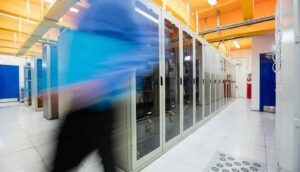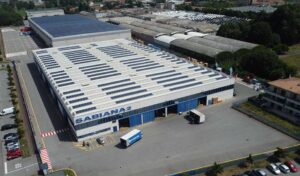Low energy fridge defrost brings rewards
30th June 2014 A new flash defrost technology, which promises to dramatically reduce the running costs of retail refrigeration equipment, is currently being trialled in stores across the UK by several leading supermarket chains.
A new flash defrost technology, which promises to dramatically reduce the running costs of retail refrigeration equipment, is currently being trialled in stores across the UK by several leading supermarket chains.
Frigesco, the UK company behind the award-winning patented system, claims the innovation can also extend the life of plant, raise food hygiene standards and improve profitability for retailers.
In UK supermarkets alone, retail display cabinets account for around 30% of total UK refrigeration power consumption. With defrosting accounting for about 30% of that power, the potential energy savings that could be achieved by a complete rethink of defrosting practices are enormous.
Frost build-up on evaporators significantly reduces the efficiency of refrigeration systems and is a serious problem for end users such as retailers. Depending on humidity levels and the amount of activity in the cabinet or cold store, frequent energy consuming defrost cycles have to be carried out a number of times each day.
Hot gas defrost carries a significant energy and performance penalty, as it requires the refrigeration system to operate outside its optimum envelope for significant amounts of time in order to generate the additional heat for defrosting. This reduces the efficiency of the refrigeration system and increases running costs for end users.
Direct electric defrost incurs a direct energy penalty through the consumption of electricity to melt frost using dedicated heaters. The use of electric fans in defrost systems adds further to energy consumption.
In both cases the addition of significant quantities of indiscriminate heat energy to refrigerated spaces must be offset by increased refrigeration input, again leading to higher electricity consumption. On the legal and safety front there is also growing concern that repeated heating of food in refrigerated spaces may lead to hygiene risks.
“Due to its high specific heat capacity and good insulation properties, accumulated frost requires a considerable amount of energy to melt it,” explains Frigesco md David Walter.
“Defrosting a refrigerated display case typically accounts for around 30% of total energy use. When multiplied across a supermarket’s estate, or indeed the combined refrigeration systems in the food supply chain across a whole country, this amounts to an immense drain on energy supplies and a huge additional cost for end users.”
Despite this, over the past five decades there have been few significant developments in the field of defrosting technology. During this time, the cost of energy has continued to rise, grid supplies have become “maxed out” in some cities, and concern has grown about the risks of exposing refrigerated food to repeated surges of heat over long periods.
Recognising the problem, Frigesco has for some time been working on a new approach to defrosting refrigeration systems that overcomes the downsides of conventional approaches.
Frigesco’s flash defrost system dramatically reduces the amount of energy required to maintain optimum frost-free conditions in refrigeration systems. Trials have shown that it can cut the overall energy consumption of refrigeration systems by up to 25%.
“It uses a specialist food-safe, phase-change material to store heat energy generated by the refrigeration system in the course of normal operation,” says David Walter. “It then uses the latent heat energy stored in the phase-change material to defrost evaporators, as and when required.”
Efficiency is improved, as it does not require electrically-driven components to deliver heat energy to the frosted evaporators, although small pumps can be used to improve the speed of the process if required.
Said to be suitable for use on both integral and remote refrigeration systems with equal success, it also has other efficiency benefits.
“As it sequesters heat produced by the refrigeration system during normal operation, it adds a sub-cooling effect, improving performance and yielding further energy savings,” David Walter reveals.
And, whereas traditional defrosting methods are extremely inefficient, with as little as 20% of the energy being used in the defrosting process, the new system uses much lower temperatures, better targeted to effect a complete defrost of the evaporator.
“This means that the temperature of stored product is maintained within much narrower limits, rather than fluctuating wildly as in the case of a traditional defrost.”
The flash defrost system has been developed by a team headed by professor Tom Davies in the UK. It uses a heat store containing a waxy phase-change material, carefully calibrated to change phase at a specific temperature.
This is placed in the refrigeration circuit after the condenser, so that heat from the warm liquid leaving the condenser is collected and stored for use during a defrost.
This has two benefits. First, heat which would otherwise be wasted is harvested and put to later use for defrosting. And second, the resulting sub-cooling of the liquid arriving at the expansion device has a beneficial effect on the overall efficiency of the system. In thermodynamic terms, the sub-cooling gain effectively pays for the post-defrost re-chilling required.
“Therefore, with no additional energy required for defrost and little extra energy needed for re-chilling, the defrost process is virtually energy-free,” says David Walter. “It has been calculated that if supermarkets adopted the system worldwide, it would save around £1.6bn in energy costs.”
This reflects adoption on display cases only. If flash defrost was also applied to store freezer rooms, Frigesco claims that the savings could potentially be doubled.
Although the main benefit is a reduction in energy use and lower running costs, the Frigesco system is claimed to deliver other attractive benefits. These include improved food hygiene and safety and more stable temperatures in the refrigerated space. Due to more complete defrosts and improved equipment operation the working life of the refrigeration equipment could also be extended and service calls reduced. Also, there are potential reductions in equipment capital costs due to design optimisation possible with the use of flash defrost. Added safety might be another benefit with more efficient defrost stopping frost build-up on floors and reducing slip hazards for store staff.
The importance of the innovation, in terms of its energy saving potential in particular, has been recognised by the UK Government. It awarded Frigesco a Department of Energy and Climate Change (DECC) grant to develop and commercialise the technology. We were subsequently invited to participate in Cleantech Innovate, the leading UK green technology event, backed by DECC and the Institution of Mechanical Engineers.
As a result of our participation, Frigesco took part earlier this year in Clean Equity Monaco 2014, an international showcase of the most promising sustainable and energy-saving technologies from around the world.
Frigesco’s flash defrost system beat 22 rival entries from 11 countries to win the top accolade for Excellence in the field of Environmental Technology Development.
Having proven the technology, Frigesco is working with a number of major UK food retailers on in-store trials. Once proven in cold rooms, the next stage will be to apply the system to refrigerated display cases.










